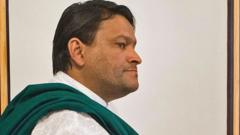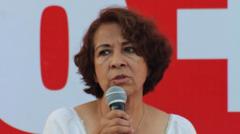The murder of Muhsin Hendricks has sent shockwaves through the LGBTQ+ community and religious circles in South Africa, prompting calls for greater acceptance and recognition of queer individuals. As a pioneer who fought for the intersection of faith and sexual identity, Hendricks’ death is not only a tragic loss but also a rallying point for advocacy against discrimination and violence.
Tragedy Sparks Outcry in LGBTQ+ Community Following Gay Imam’s Brutal Murder

Tragedy Sparks Outcry in LGBTQ+ Community Following Gay Imam’s Brutal Murder
The shocking killing of South Africa’s first openly gay imam, Muhsin Hendricks, ignites discussions around violence, acceptance, and the ongoing struggles regarding LGBTQ+ rights in religious circles.
In a tragic event, the LGBTQ+ community in South Africa is mourning the loss of Muhsin Hendricks, the first openly gay imam, who was murdered in a violent act on Saturday in Gqeberha. At 57 years old, Hendricks was known for his dedication to inclusivity and representation within Islam, leaving a profound impact on queer Muslims around the world. Reverend Toni Kruger-Ayebazibwe spoke to the BBC with deep sorrow, acknowledging Hendricks as a "gentle spirit" whose absence is felt deeply by many, especially in the wake of his shocking death.
Despite initial erroneous claims that he was in Gqeberha to officiate same-sex marriages, Hendricks was there to oversee interfaith heterosexual unions, reflecting his commitment to embracing diversity. The Al-Gurbaah Foundation, which he led, made a statement clarifying his purpose and expressing devastation over his loss. Even in such precarious circumstances, Hendricks's actions and choices spoke volumes about his mission to challenge conventional religious norms.
The Muslim Judicial Council (MJC) and the United Ulama Council of South Africa (UUCSA) condemned his killing, emphasizing the need for peaceful coexistence in a democratic society. However, Hendricks had long faced opposition from traditional Islamic authorities who viewed his sexual orientation as incompatible with Islamic beliefs. Supporters hailed him as a transformative figure, enabling many to reconcile their faith with their identity.
South Africa prides itself on being a front-runner in LGBTQ+ rights in Africa, having legalized same-sex marriage in 2006, yet violent incidents against the community persist. Although some religious groups have begun to adopt more inclusive policies, deep-seated conservatism remains prevalent. Reverend Ecclesia de Lange noted that the contradiction between inclusive policies and conservative ideologies places queer individuals at risk for continued marginalization.
Dr. Fatima Essop from the University of the Western Cape expressed her shock at the hateful sentiments circulating online post-Hendricks's death. She argued that such hostility contradicts the essence of Islamic teachings centered on compassion and respect for life. The nature of Hendricks's murder is likely to deter others from freely discussing their sexuality, reinforcing the culture of fear.
As LGBTQ+ activists and leaders take a moment to reflect on Hendricks's legacy, they pledge to continue the fight for rights and recognition, undeterred by the violence they face. Hendricks’ influential work has already inspired a network of support for queer Muslims, helping many navigate the intersection of faith and sexual orientation.
Muhsin Hendricks has been laid to rest privately, but memorials are being planned to celebrate his life and contributions to the LGBTQ+ community. Advocates like Teboho Klaas express hope that even in his death, Hendricks’s legacy will endure, inspiring new generations to stand against hate and push for acceptance.






















